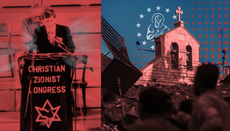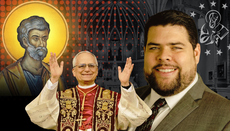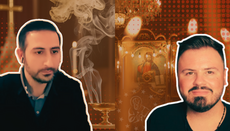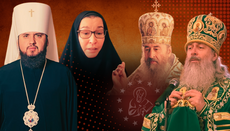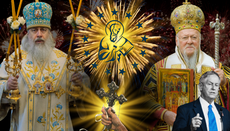The Nestorian Moment
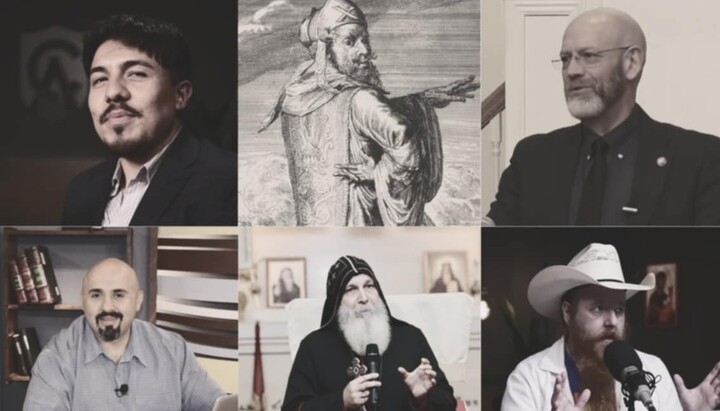
Protestants and Catholics are attempting to rehabilitate Nestorius—Why?
Originally Posted on Yankee Athonite.
In A.D. 431, Emperor Theodosius II convened the Third Ecumenical Council. The bishops met in Ephesus under the presidency of Saint Cyril, Pope of Alexandria.
The bishops were summoned to address certain errors being taught by Nestorius, the Patriarch of Constantinople. Nestorius claimed that Christ is two persons: one human, one divine. Cyril, however, held that Christ is one divine Person with two natures: human and divine.
The Council ultimately ruled in Cyril’s favor, and nearly all the Nestorian bishops were reconciled to the Church.
However, in recent years, “conservative” Christians—mainly Protestants and Catholics, from what I can tell—have begun working to rehabilitate the memory of Nestorius. Some even seek to legitimize the Nestorian Church.
1. Protestants for Nestorius
For instance, the Protestant apologist James White recently criticized Catholics and Orthodox Christians for referring to Mary as Theotokos, or Mother of God (literally “God-Birthgiver”).
White begins by steelmanning the pro-Theotokos argument: “Jesus is God, come in human flesh. Mary is Jesus’ mother. Hence, Mary is the mother of God. What could be simpler?” However, White then offers a (conditional) defense of Nestorius’s objection to this title:
"One of the principal participants in the debate over the nature of Christ was a man named Nestorius. But since he was eventually condemned as a heretic, we have some doubt as to whether we have a completely accurate (or fair) view of his beliefs, as they have come down to us primarily through the writings of his enemies. Basically, Nestorius objected to the use of the word theotokos. He quite rightly expressed concern that the word could be easily misunderstood. But most importantly, his denial of the propriety of theotokos led him to insist that Mary was the mother only of the human 'element' of Christ, which resulted in a functional separation of the divine from the human in Christ. The basic danger of Nestorius’ position, then, was that it led to a Jesus who was two “persons,” with no real connection between the divine and the human."
Unfortunately, White’s reading is completely wrong.
Firstly, the idea that Nestorius “rightly” believed that the term would be “misunderstood” is absurd. No one has ever believed that Mary is the mother of the whole Trinity. No one has ever said that the existence of God the Father, Son, and/or Holy Spirit is contingent upon Mary.
Secondly, there was a robust debate over the title Theotokos at Ephesus. The Council Fathers made clear the theological implications of Nestorius’s position. That’s the whole point of an Ecumenical Council. Folks seem to think that all the bishops just get together, issue their anathemas, and go home in time for lunch. No: they held robust debates, which could last for months.
In fairness, White isn’t defending Nestorius because he agrees with Nestorius’s theology—that Christ is actually two persons with two natures. Rather, he objects to the way the title is “used” in the 21st century:
"Outside of seminary classes and theological debates about the Trinity, I have never heard the term 'Mother of God' used in a historically proper and theologically accurate way. That is, every time I have heard the title used outside those contexts it was being used to say something about Mary rather than something about Christ. Obviously, Nestorius was right about one thing: the term is liable to serious misuse and misunderstanding."
Again, this is all wrong. If Nestorius was simply afraid of giving undo honor to Mary, saying that she’s “only” Christotokos wouldn’t help.
To put it another way: the Nestorians could have addressed the question of Christ’s Personhood without resorting to titles at all. They could have stuck to dogmatic definitions, which are more precise, if less poetic.
But the whole point of a title is to honor someone. And, at the Council of Ephesus, both the orthodox and the heterodox felt the need to honor Mary. As she herself said, “All generations shall call me blessed.”
No one at the Council of Ephesus—Cyrillian or Nestorian—was afraid of giving honor to Mary. Indeed, we know that the men who first referred to Mary as Theotokos also prayed for her intercession. The earliest known Marian hymn, the “Sub Tuum Praesidium,” dates to the third century and refers to Mary by this title:
Ὑπὸ τὴν σὴν εὐσπλαγχνίαν,
καταφεύγομεν, Θεοτόκε.
Τὰς ἡμῶν ἱκεσίας,
μὴ παρίδῃς ἐν περιστάσει,
ἀλλ᾽ ἐκ κινδύνων λύτρωσαι ἡμᾶς,
μόνη Ἁγνή, μόνη εὐλογημένη.
(Beneath thy compassion,
we take refuge, O God-Birthgiver [Theós-tóke].
Do not overlook our supplications in times of trouble,
but deliver us from danger,
Only pure, only blessed one.)
White suggests that the debate at Ephesus was not fundamentally about christology; rather, it was about the fittingness of giving Mary titles. That’s the exact opposite of the truth. Nestorius had no problem honoring Mary with a title, and neither did the Cyrillians. They were debating which title had more theological merit.
All too often, Protestants like White fall into this trap of recklessly defining themselves against Catholicism. They’re not mainly concerned with developing a theologically or historically accurate understanding of Mary. They just want to contradict Rome as stridently as possible. And, granted, Catholic Mariology can get excessive. But Protestants like White badly overcorrect, to the point where they’re willing to defend arch-heretics like Nestorius to the Fathers of the Church.
Actually, we Orthodox prefer the title Theotokos precisely because it keeps the focus on Jesus. You will rarely hear the Orthodox refer to Mary as “the Virgin Mary” or “the Blessed Virgin.” Those are mainly Catholic terms. There’s nothing wrong with them, of course! They are not inaccurate, blasphemous, or anything like that. But, generally, we desire to speak about Mary in the most “christocentric” way possible. And we think this is her preference, too!
2. Catholics for Nestorius
Sadly, many influential Catholics are also working to rehabilitate Nestorius.
The popular apologist Alex Jurado, better known by his YouTube handle “Voice of Reason,” is also a defender of Nestorius. In a recent debate, Jurado claims that the Fathers of Ephesus simply “misunderstood” Nestorius’s theology:
"Nestorianism is the heresy that splits Jesus into two, that there’s a Divine Jesus and there’s a human Jesus. And the orthodox view is that Jesus in his divinity is also fully man, and Jesus in His humanity is also fully God. And [Nestorianism] was condemned at the Council of Ephesus in 431. They condemned the heresiarch Nestorius. But it turns out now, the consensus in the scholarship is that Nestorius wasn’t actually a Nestorian. And it was the Council Fathers that misunderstood him. So, they wrongfully condemned Nestorius, but they rightfully upheld the orthodox Faith."
Jurado is making essentially the same point as White: The views to which the Council of Ephesus referred as “Nestorianism” are, indeed, erroneous. However, Nestorius did not hold those views. Therefore, Nestorius is not a heretic. Jurado has a very different reason for advancing this view, however.
In recent decades, Catholic officials have signed ecumenical statements with the Nestorian Church, in which they agree that the two groups hold to the same christology and always have. Rome’s official position is that the debate at Ephesus was just a big misunderstanding.
Part of the impetus behind these concordats is the fact that two Eastern Catholic churches regard Nestorius as a saint: the Chaldean and the Syro-Malabar. Both, of course, have their origins in the Nestorian Church. So, Catholic apologists need to explain why the Vatican has tolerated the veneration of a condemned heretic.
Jimmy Akin of Catholic Answers has made the same argument as Jurado:
"After the Council of Ephesus, Nestorius accepted the Church’s judgment. He said, “Actually, no, I don’t think Jesus is two persons. Let me clarify.” And he did! He clarified his views. He didn’t like calling Mary 'mother of God,' but he clarified that he didn’t think Jesus was two persons. And he accepted the Church’s judgment, and he died in communion with the Church. [Nestorius] died a faithful Catholic. Should we be calling faithful Catholics heretics? No.
(...)
If he could clarify his view in an orthodox way, so can the Nestorian churches. And they did! In the reign of Saint John Paul II, they signed a joint declaration on christology with us, where both they and us said, 'Even though we express ourselves using different language, we agree on the substance.' So, we don’t want to be triumphalistic or accusing the so-called Nestorian Churches of being heretics."
I’m a big fan of Jimmy’s, but this is unbelievable.
Firstly, the Council of Chalcedon—the next Ecumenical Council following Ephesus—renewed the condemnation of Nestorius:
"Moreover, the exposition of their faith, of the illustrious Cyril of blessed memory set forth at the Council of Ephesus (in which Nestorius was condemned) is received. And in the third place the writings of that blessed man, Leo, Archbishop of all the churches, who condemned the heresy of Nestorius and Eutyches, show what the true faith is. Likewise, the holy Synod holds this faith, this it follows; nothing further can it add, nor can it take anything away."
Now, Nestorius died after the Council of Chalcedon. Why would the Council Fathers not have mentioned that Nestorius was reconciled to the Church? Indeed, after Ephesus, Nestorius was exiled and murdered by bandits in the deserts of Egypt. I have no idea where Akin is getting his information from. (Nestorians, probably.)
Secondly, why would the Nestorian Church have emerged as a separate “ecclesiastical community” if Nestorius was immediately reconciled to the Church? In other words: if there was no schism, why is there a schism?
The fact that, in Akin’s account, Nestorius never got used to the idea of calling Mary “Theotokos” shows that he never reconciled himself to orthodox, Cyrillian Christology. Likewise, the fact that the modern Nestorians do not use the title Theotokos and do not affirm the Council of Ephesus proves that they still adhere to heresy.
Then there’s Sam Shamoun, another YouTube apologist, who is by far the most enthusiastic apologist for Nestorianism in the Catholic Church. I don’t want to open that can of worms but, if you watch any of his pro-Nestorian content, he commits the same fallacies as Jurado and Akin.
In the past, Rome simply turned a blind eye when Uniates venerated Nestorius. Since Vatican II, however, the Vatican has been working to rehabilitate the heresiarch and to validate the heretical, schismatic sect which he founded. This is deeply unfortunate.
3. Nestorians for Nestorius
Finally, we have the case of Mar Mari Emmanuel, the Nestorian bishop with a popular TikTok channel.
Father Mikhail Baleka of Living Orthodox has published a fantastic exposé on Emmanuel, which I encourage everyone to watch. In it, Fr. Mikhail clips one of Emmanuel’s less popular sermons, where he attempts to reconcile the Ephesian and Nestorian Christologies:
"Do I have a problem when anyone comes and says Mary is the mother of God? No. No. No. Because I’ll ask you this: when you say, 'Mary is the Mother of God [Theotokos],' who is this God? They’ll say Christ. When you come to me and I say, 'Mary is the mother of Christ [Christotokos],' who is this Christ? I’ll say, 'God revealed in the flesh, the word incarnate. So what’s your problem? Obviously when you say Mary is the mother of God, I know that . . . you don’t mean God the Divine alone, because it doesn’t make sense. God as the Divine cannot have a mother in the literal sense. Why? Because He is the Creator of Mary. If God has a mother, then she comes before Him, she’s greater than Him, and she precedes Him. This is impossible for any Christian with a clear mind and a good conscience not to know this."
It should be obvious to any right-thinking Christian that Emmanuel’s synthesis is unacceptable. Just to be sure, though, Fr. Mikhail clips another sermon in which Emmanuel expounds upon Nestorian Christology more explicitly:
"The only one who can forgive sins is God. Since God only can forgive sins, therefore God cannot have a mother, because He’s the creator of Mary. If Mary is the mother of God, then she came before him! She gave birth to him! . . . As the Divine, He cannot have a mother. He’s the creator of Mary. That’s why he called her 'woman.' We need to study the Holy Bible."
Another Orthodox apologist, David Erhan, also found a video of Emmanuel singing a traditional Nestorian hymn:
"It was not God who was born of Mary as the heretics dared to confess.
Again, she did not give birth to man, as the confused Arius proclaimed.
Instead, she gave birth to Christ, as Saint Nestorius professed."
If Ephesus was all just a big misunderstanding, why did the Nestorians call us heretics? If we’ve resolved our differences, why are they still calling us heretics? Why are they repeating the same heretical teachings that led to their condemnation in 431?
Elsewhere, Emmanuel says of Jesus: “God dwelled in this Man.” He also says that it’s “theologically wrong” to refer to the Eucharist as God’s body. Again, the error of Nestorius is that Christ is two persons occupying one body. He held that God the Son possessed the body of Jesus the way a demon possesses a demoniac.
This is what Nestorians believe. Regardless of how the Nestorians may represent themselves during “ecumenical dialogues,” that much should be abundantly clear. They do not believe what we believe. Nestorians are heretics; there’s no two ways about it.
We must choose whether we stand with Saint Cyril and the Fathers of Ephesus, or with Nestorius and his sectaries. Because we can’t do both.
